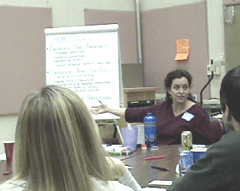This Is Your Brain on Poverty
Air Date: Week of February 29, 2008

Dr. Jessica Fanning of the University of Oregon, who developed the parent training program, meeting with groups of families. (Photo: University of Oregon)
Recent research suggests that the stress of poverty may lead to problems with memory and language skills. Living on Earth's Emily Taylor reports.
Transcript
ANNOUNCER: Support for the environmental health desk at Living on Earth comes from the Cedar Tree Foundation. Support also comes from the Richard and Rhoda Goldman Fund for coverage of population and the environment. This is Living on Earth on PRI, Public Radio International.
[MUSIC: Dean Frasier: “Bank Of The River” from Big Up (Island Jamaica Jazz 1997)]
CURWOOD: It’s Living on Earth, I’m Steve Curwood. Let’s face it. Life can be stressful, and too much stress can be toxic. If there’s too much to do or too many bills to pay, the price can be a heart attack or a descent into depression. And now emerging brain science is finding more and more evidence that stress adversely affects infants and children and can lead to damage that may last a lifetime. This research also offers insights into the persistence of poverty. Living on Earth's Emily Taylor has our report.
TAYLOR: A child's brain is fragile, vulnerable to many outside influences like television, video games, and playmates. And though child advocates often complain about the ill effects of TV and advertising on young brains, scientists now think that childhood poverty may be one of the most damaging influences of all.
FARAH: I guess it's kind of obvious that living in poverty results in a lot more stress in your life.
TAYLOR: That's Martha Farah, Director of the Center for Cognitive Neuroscience at the University of Pennsylvania.

Martha Farah, Director of the Center for Cognitive Neuroscience, University of Pennsylvania. (Courtesy of Martha Farah)
TAYLOR: And Courtney Stevens of the University of Oregon says there's no question this stress causes harm: not just to parents, but also to their children's brain development.
STEVENS: What we know is that poverty has a way of crawling under the skin and getting into the brain. We know one of the big mechanisms whereby this happens is through stress – that high levels of stress for a child in a sense produces a toxic environment within that child's body for healthy brain development and healthy cognitive skills.

Courtney Stevens, Research Fellow at the Brain Devlopment Lab, University of Oregon. (Courtesy of Courtney Stevens)
Essentially this research showed that a mother rat can buffer her offspring from stress by being attentive and nurturing. And if she does this, if she grooms, licks, and nurses her litter, her babies are more likely to develop normally, specifically in the area of the brain responsible for memory – the hippocampus.
That's because the hippocampus is highly sensitive to the stress hormone cortisol, say the researchers. Cortisol prepares the body for the "fight or flight" response. It sends signals to the hippocampus saying 'hey remember what's happened' so that next time the situation can be avoided. But repeated stress can damage the hippocampus. So in rats, if the mother doesn't nurture her baby – say if she's separated from it – it will later perform poorly on memory tests.

Dr. Jessica Fanning of the University of Oregon, who developed the parent training program, meeting with groups of families.
(Photo: University of Oregon)
Farah says poor maternal nurturing can often be because the mother's depressed.
FARAH: So stress we know is itself neurotoxic: it impacts the developing nervous system. In addition, there are factors like the greater incidence of maternal depression in poor families, and we know from studies of people at all income levels that maternal depression is actually very bad for child development. When moms are depressed they pay less attention to the kids. They engage with them less, they are less, you know, warm and involved, because they're depressed.
TAYLOR: Farah and her colleagues noted another association. When the environment was less stimulating, with fewer books and toys and less-engaged parents, the poorer the child's language skills were later in life. These results weren't totally surprising – rat studies show that cages with more toys will lead to positive brain changes in the rodent. So improving a child's memory and language skills may be as simple as targeting the parents. And that's exactly what Courtney Stevens and her colleagues at the University of Oregon are aiming to do.

(Photo: University of Oregon)
TAYLOR: And these increased intelligence and language skills are the keys to success for children – both at school and in life.
For Living on Earth, I'm Emily Taylor.
Links
Neuroethics at the University of Pennsylvania
Living on Earth wants to hear from you!
Living on Earth
62 Calef Highway, Suite 212
Lee, NH 03861
Telephone: 617-287-4121
E-mail: comments@loe.org
Newsletter [Click here]
Donate to Living on Earth!
Living on Earth is an independent media program and relies entirely on contributions from listeners and institutions supporting public service. Please donate now to preserve an independent environmental voice.
NewsletterLiving on Earth offers a weekly delivery of the show's rundown to your mailbox. Sign up for our newsletter today!
 Sailors For The Sea: Be the change you want to sea.
Sailors For The Sea: Be the change you want to sea.
 Creating positive outcomes for future generations.
Creating positive outcomes for future generations.
 Innovating to make the world a better, more sustainable place to live. Listen to the race to 9 billion
Innovating to make the world a better, more sustainable place to live. Listen to the race to 9 billion
 The Grantham Foundation for the Protection of the Environment: Committed to protecting and improving the health of the global environment.
The Grantham Foundation for the Protection of the Environment: Committed to protecting and improving the health of the global environment.
 Contribute to Living on Earth and receive, as our gift to you, an archival print of one of Mark Seth Lender's extraordinary wildlife photographs. Follow the link to see Mark's current collection of photographs.
Contribute to Living on Earth and receive, as our gift to you, an archival print of one of Mark Seth Lender's extraordinary wildlife photographs. Follow the link to see Mark's current collection of photographs.
 Buy a signed copy of Mark Seth Lender's book Smeagull the Seagull & support Living on Earth
Buy a signed copy of Mark Seth Lender's book Smeagull the Seagull & support Living on Earth

